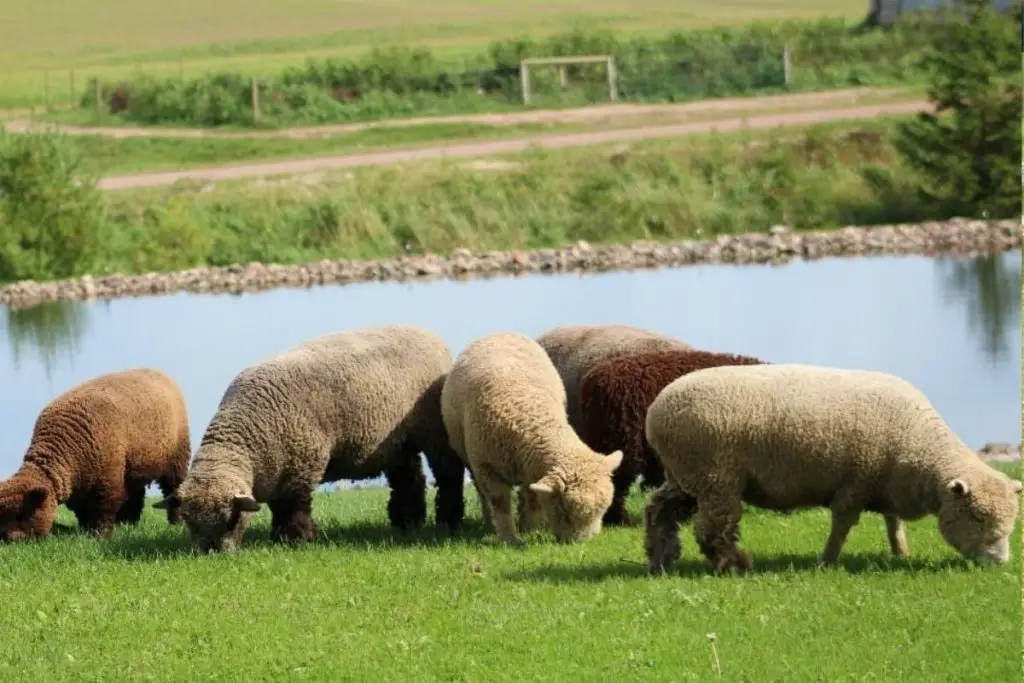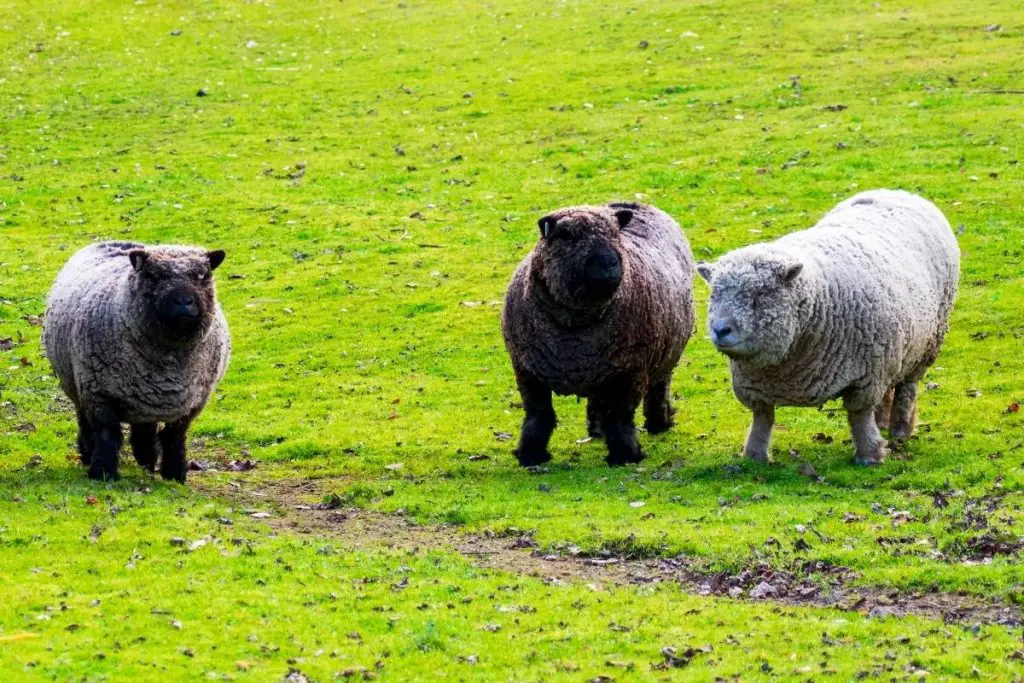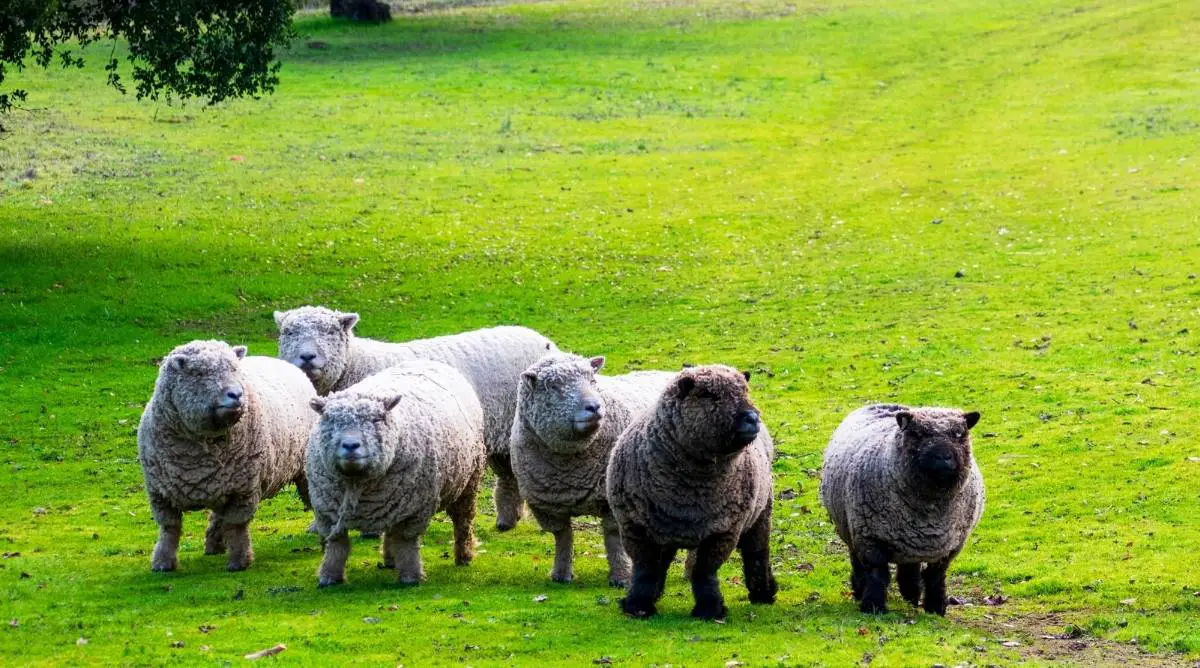The smallest mini sheep is the Ouessant sheep, and one of the most popular is the Babydoll Southdown sheep. Mini sheep make great pets, are ideal for hobby farmers, and need less land than full-sized sheep. Read on to learn more about these adorable animals.
Table of Contents
Ouessant sheep are the smallest mini sheep
The Ouessant sheep originally came from Oessant island in Brittany, France.
Known for its hardiness and ability to survive harsh weather conditions, Ouessant sheep adapted to a diet of limited grass for grazing, making their small size naturally advantageous.
In fact, at around 18 inches tall and as small as 40 pounds, Ouessant sheep are the smallest breed of sheep to ever occur naturally.
Its wool is highly sought-after and comes in black, brown, off-white, and cream colors.
Ouessants are an endangered heritage breed.
There are multiple breeds of mini sheep

- Babydoll Southdown: With its teddy bear features and small sheep size, it’s become a popular choice for hobby farms and pet shows. Babydoll Southdown sheep stand at around 18 to 24 inches tall, with a weight averaging 60 to 125 pounds. The breed originated in England and reached the North America in the 1800s.
- Mini Harlequin: Standing at 23 inches, the Mini Harlequin is easy to handle and a growing option for hobby farms. Ewes weigh 80-120 pounds and rams weigh 90-150 pounds.
- American Mini Cheviot: A small sheep breed originiating in the Cheviot Hills of England. They were introduced to North American farms in 1838. They stand at a maximum of 23 inches tall, with a weight averaging 45 to 100 pounds. Known for its fleece and crimp, mini Cheviots are a favorite of handspinners.
- Miniature Shetland: Native to Britain, the miniature Shetland stands at 17 to 23 inches tall and weighs about 75 to 125 pounds. One striking quality of this little sheep is its wide range of wool colors, which have a fineness of up to 15 microns.
Mini sheep make good pets

Tiny sheep breeds like the Babydoll Southdown, Mini Cheviot, and Miniature Shetland are ideal pets. They tend to be cute and easy to manage, with gentle dispositions.
Mini sheep do well on small plots of land, making them good companion animals.
Mini sheep are perfect for hobby farmers
Hobby farmers are responsible for the surging interest in miniature breeds of sheep.
Hobbyists tend to seek out sheep that are cute, easy to manage, require small plots of land, and are economical. Mini sheep are an ideal low-maintenance option for hobby farms.
Mini sheep need less food than large sheep
Mini sheep naturally need less food than large sheep. Some of them, like the Ouessant, evolved to survive in conditions with little food, so their small body weight became a survival advantage.
Mini sheep can serve as natural lawnmowers for your hobby farm, trimming grass and eating weeds.
Mini sheep need less land (or even just a backyard)
Mini sheep need some land to graze and roam, but a farm isn’t necessary for them.
A large yard of an acre or so is enough for a few sheep.
Mini sheep come in different colors
Just like larger sheep, mini sheep come in all kinds of different colors.
Mini Harlequins have tri-color fleeces, while miniature Shetlands have nearly a dozen colors and even more patterns.
Benefits to having miniature sheep
Mini sheep thrive on small plots of land, have a gentle disposition, and often have a cute, teddy bear-like appearance.
These sheep straddle the line between traditional pets and farm animals, and are popular as low-maintenance additions to hobby farms.
Drawbacks to mini sheep
While you only need an acre or so for mini sheep, you’ll want to get more than one. Mini sheep have strong flocking instincts, so you having a small flock of at least 2-3 will keep them sociable.
Mini sheep also have fewer commercial advantages. Due to their small size, they produce less wool, milk, and meat than larger sheep. This makes them better suited to small-scale farms and hobby farms.

